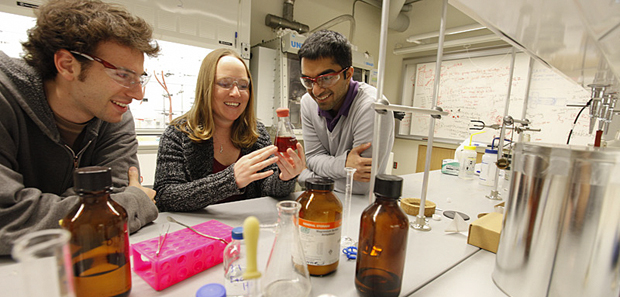Going to the head of the class in teaching
Davis Teaching and Learning Fellowship connects, informs and strengthens faculty
 Photo/Mike Lovett
Photo/Mike LovettChemistry professor and Davis Fellow Christine Thomas works with students
Jennifer Cleary, a senior lecturer in theater arts, usually has a constant stream of students walking in and out of her ground-floor office in Spingold Theater but sometimes she can go a whole day without interacting with other faculty, especially those outside of the theater department.
All that changed last year when Cleary became a Davis Teaching and Learning Fellow, and joined a campus-wide community of scholars rethinking effective education. Now in its second year, the fellowship has become an invaluable resource for faculty to discuss and implement effective teaching methods, while strengthening the university’s commitment to faculty excellence as outlined in Brandeis’ Strategic Plan.
“The Davis fellowship showed me I was not alone in the challenges I face in the classroom,” Cleary says. “There is a whole community out there of other thoughtful educators.”
The competitive program, supported by the Davis Educational Foundation, selects 14 fellows each year from a range of disciplines to discuss teaching, learning and student assessment. This year’s cohort includes, among others, a chemist, an economist, an educator and a philosopher. They observe each other’s classes and meet every two weeks to discuss teaching philosophies, demonstrate ideas and develop classroom strategies.
“Too often in higher education, there is little or no discussion on how to be an effective teacher,” says biologist Dan Perlman, program facilitator and associate provost of innovation in education. “But the Davis Teaching and Learning Fellowship has quickly became a place where we have wide-ranging discussions about learning and teaching, from many different viewpoints and disciplines.”
“There are a lot of cross-fertilization strategies,” says Catherine Mann, the Barbara and Richard M. Rosenberg Professor of Global Finance. “That cross fertilization not only strengthens us, as educators, but the university as a whole.”
Mann is already seeing the benefits: New techniques have boosted classroom discussion and comprehension in her courses.
Even the most seasoned fellows are learning from discussions and classroom observations.
Sharon Feiman-Nemser, the Mandel Professor of Jewish Education, has taught education courses and studied teaching and learning for decades. In one meeting of the Davis Fellows, a colleague asked the group: What is the difference between productive and unproductive confusion among your students?
“I thought that was a generative distinction,” Feiman-Nemser says. “Sometimes confusion is part of the process of learning. But sometimes, your students should not be confused and if they are, it’s important to offer needed clarification. We discussed how to tell the difference and use it to benefit teaching.”
The Davis Teaching and Learning Fellowship demonstrates Brandeis’ commitment to education, says Kate Moran, assistant professor of philosophy.
“The more educational options people have, the more universities have to think about what they can offer to students,” says Moran. “One of the really special things Brandeis offers is a thoughtful faculty dedicated to teaching.”
Categories: General





